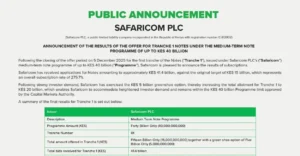What is erratic income? This refers to income that is irregular or unpredictable in nature. Unlike a fixed salary or consistent monthly wages, erratic income can vary significantly from month to month or even week to week.
It often characterizes:
◾ Self-employment
◾ Freelance work
◾ Commission-based jobs
◾ Seasonal employment
◾ Industries with fluctuating demand
Also read: 5 Strategies For Boosting Your Income:
Individuals with erratic income may experience periods of high earnings followed by lean months or unpredictable cash flow patterns. If your are an erratic income earner, the following will guide you in managing your finances effectively:
1️⃣ Budget
Create a detailed budget that covers both your fixed expenses and variable ones. Account for fluctuations in income by prioritizing essential expenses.
2️⃣ Emergency fund
Build an emergency fund to cover unexpected expenses or lean months. Aim for at least three to six months’ worth of living expenses.
3️⃣ Track your income
Keep records of your income streams, including their frequency and amounts. This helps you anticipate patterns and plan accordingly.
4️⃣ Save during peak months
During high-income periods, save surplus income to cushion against future downturns. This disciplined approach helps smooth out financial fluctuations.
5️⃣ Diversify income sources
Explore multiple income streams to reduce dependency on a single source. This could include freelance work, part-time jobs, investments, or passive income streams.
6️⃣ Adjust spending patterns
Be prepared to adjust your spending habits during lean months. Cut back on non-essential expenses and focus on essentials until your income stabilizes.
7️⃣ Manage cash flow
Maintain a buffer to cover expenses during low-income periods. Schedule bill payments strategically based on income arrival dates.
8️⃣ Set realistic goals
Align your financial goals with your variable income reality. Set achievable milestones and timelines that consider income variability.
9️⃣ Communicate with creditor
If you anticipate difficulty meeting financial obligations, communicate proactively with creditors. Many lenders offer flexible repayment options during financial hardships.
1️⃣ 0️⃣ Seek professional advice
Consider consulting a financial advisor or accountant experienced in managing variable income. They can offer personalized strategies and insights tailored to your situation.





